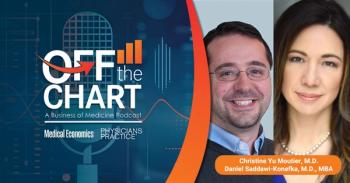
Combating a culture of perpetual burnout
Physicians can take a note from professional athletes
While these two may be the most recent big names in the discussion about burnout, mental health, and how to cope and thrive in the wake of immense criticism coming as a result of prioritizing self-care first, they certainly will not be the last. As a practicing OB physician and hospitalist, I found myself identifying with the plight of these two women and their decision to step back rather than “lean in” as so many of us high-achieving women are told to do. There’s a breaking point that must be acknowledged, and taking steps to protect ourselves against reaching this point must be normalized.
As the threat of the delta variant rises and the public and policymakers deal with the realities of an ongoing pandemic, it is more important than ever for the healthcare workforce to assess their own mental health and take steps towards lifestyle adjustments that help ensure we are at our best for our patients and prepared for the road ahead.
Learn to Say No
As a physician, the pressure to keep going and the shame of saying “no” is incredible. In 2021, we often talk about setting boundaries, be it with friends, families, or in relationships. Yet the same applies to the work setting—consistently taking on more than should be feasible for one person continues to be a badge of honor in the world of medicine. Applying boundaries to our own work life can be as simple as saying no to covering additional shifts, taking on volunteer activities, or even cutting back on hours to avoid burnout.
Do Not Compare Your Own Journey or Needs to Others
I worked in a large private practice when I became pregnant with my first child and remember some of my colleagues being appalled when I requested six weeks off for maternity leave, regaling me with stories of their experiences making patient rounds only two weeks after their own children were born. I wanted to take the time off, but the pressure to return to work as soon as possible was incredible. And in hindsight, prioritizing my job over my child was a huge mistake. When I was pregnant with my second child, I said never again.
My personal journey involved moving to an OB hospitalist role, where I could have more control over my hours, spend more time with my family, and focus on clinical care. For others, it might involve moving workplaces, taking time off, or simply finding techniques to tune out the criticisms of others. Every journey is different, and the road to burnout should never be a competition.
Prioritize Yourself
While females in medicine may feel they have to give up their careers when they can’t balance the needs of family and work, there are other options. For example, in my own role, becoming a hospitalist allowed me to set clear boundaries between work and home. Part-time opportunities are also an option that can enable physicians to keep their careers going while meeting the needs of their family and mental health.
Put Yourself in Your Patient’s Shoes (or Slippers)
Physicians have incredible expectations of our colleagues, yet we have much different instructions for our patients (e.g., avoid stress, take time off, eat healthy, take care of yourself). We would never tell our patients to walk a path that leads to poor health; we should be following our own advice. Especially in the age of COVID-19, physicians must be more comfortable with taking sick time, using employee assistance program resources such as counseling, and taking time to rest and recuperate.
Normalizing setting boundaries in medicine, especially as our workplaces become more nuanced and uncertain with COVID-19 and its variants, is absolutely essential. If we don’t take a page from other high performers and draw boundaries to sustain ourselves, healthcare will not have the workforce it requires to keep patients safe and operations running.
About the Author
Rakhi Dimino , MD, is Medical Director of Operations for the Ob Hospitalist Group and a practicing OB/GYN. She is based in Houston, TX.
Newsletter
Optimize your practice with the Physicians Practice newsletter, offering management pearls, leadership tips, and business strategies tailored for practice administrators and physicians of any specialty.








